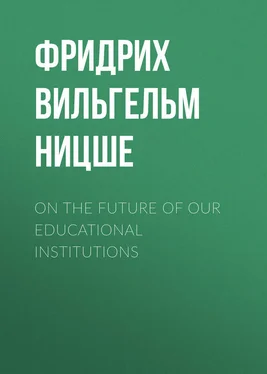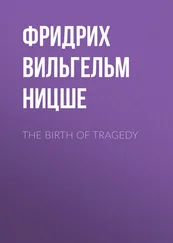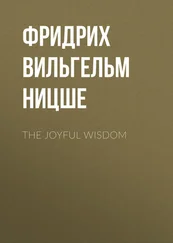Фридрих Ницше - On the Future of our Educational Institutions
Здесь есть возможность читать онлайн «Фридрих Ницше - On the Future of our Educational Institutions» — ознакомительный отрывок электронной книги совершенно бесплатно, а после прочтения отрывка купить полную версию. В некоторых случаях можно слушать аудио, скачать через торрент в формате fb2 и присутствует краткое содержание. Жанр: Философия, literature_19, foreign_antique, foreign_prose, на английском языке. Описание произведения, (предисловие) а так же отзывы посетителей доступны на портале библиотеки ЛибКат.
- Название:On the Future of our Educational Institutions
- Автор:
- Жанр:
- Год:неизвестен
- ISBN:нет данных
- Рейтинг книги:3 / 5. Голосов: 1
-
Избранное:Добавить в избранное
- Отзывы:
-
Ваша оценка:
- 60
- 1
- 2
- 3
- 4
- 5
On the Future of our Educational Institutions: краткое содержание, описание и аннотация
Предлагаем к чтению аннотацию, описание, краткое содержание или предисловие (зависит от того, что написал сам автор книги «On the Future of our Educational Institutions»). Если вы не нашли необходимую информацию о книге — напишите в комментариях, мы постараемся отыскать её.
On the Future of our Educational Institutions — читать онлайн ознакомительный отрывок
Ниже представлен текст книги, разбитый по страницам. Система сохранения места последней прочитанной страницы, позволяет с удобством читать онлайн бесплатно книгу «On the Future of our Educational Institutions», без необходимости каждый раз заново искать на чём Вы остановились. Поставьте закладку, и сможете в любой момент перейти на страницу, на которой закончили чтение.
Интервал:
Закладка:
Friedrich Wilhelm Nietzsche
On the Future of our Educational Institutions
PREFACE
The reader from whom I expect something must possess three qualities: he must be calm and must read without haste; he must not be ever interposing his own personality and his own special "culture"; and he must not expect as the ultimate results of his study of these pages that he will be presented with a set of new formulæ. I do not propose to furnish formulæ or new plans of study for Gymnasia or other schools; and I am much more inclined to admire the extraordinary power of those who are able to cover the whole distance between the depths of empiricism and the heights of special culture-problems, and who again descend to the level of the driest rules and the most neatly expressed formulæ. I shall be content if only I can ascend a tolerably lofty mountain, from the summit of which, after having recovered my breath, I may obtain a general survey of the ground; for I shall never be able, in this book, to satisfy the votaries of tabulated rules. Indeed, I see a time coming when serious men, working together in the service of a completely rejuvenated and purified culture, may again become the directors of a system of everyday instruction, calculated to promote that culture; and they will probably be compelled once more to draw up sets of rules: but how remote this time now seems! And what may not happen meanwhile! It is just possible that between now and then all Gymnasia – yea, and perhaps all universities, may be destroyed, or have become so utterly transformed that their very regulations may, in the eyes of future generations, seem to be but the relics of the cave-dwellers' age.
This book is intended for calm readers, – for men who have not yet been drawn into the mad headlong rush of our hurry-skurrying age, and who do not experience any idolatrous delight in throwing themselves beneath its chariot-wheels. It is for men, therefore, who are not accustomed to estimate the value of everything according to the amount of time it either saves or wastes. In short, it is for the few. These, we believe, "still have time." Without any qualms of conscience they may improve the most fruitful and vigorous hours of their day in meditating on the future of our education; they may even believe when the evening has come that they have used their day in the most dignified and useful way, namely, in the meditatio generis futuri . No one among them has yet forgotten to think while reading a book; he still understands the secret of reading between the lines, and is indeed so generous in what he himself brings to his study, that he continues to reflect upon what he has read, perhaps long after he has laid the book aside. And he does this, not because he wishes to write a criticism about it or even another book; but simply because reflection is a pleasant pastime to him. Frivolous spendthrift! Thou art a reader after my own heart; for thou wilt be patient enough to accompany an author any distance, even though he himself cannot yet see the goal at which he is aiming, – even though he himself feels only that he must at all events honestly believe in a goal, in order that a future and possibly very remote generation may come face to face with that towards which we are now blindly and instinctively groping. Should any reader demur and suggest that all that is required is prompt and bold reform; should he imagine that a new "organisation" introduced by the State, were all that is necessary, then we fear he would have misunderstood not only the author but the very nature of the problem under consideration.
The third and most important stipulation is, that he should in no case be constantly bringing himself and his own "culture" forward, after the style of most modern men, as the correct standard and measure of all things. We would have him so highly educated that he could even think meanly of his education or despise it altogether. Only thus would he be able to trust entirely to the author's guidance; for it is only by virtue of ignorance and his consciousness of ignorance, that the latter can dare to make himself heard. Finally, the author would wish his reader to be fully alive to the specific character of our present barbarism and of that which distinguishes us, as the barbarians of the nineteenth century, from other barbarians.
Now, with this book in his hand, the writer seeks all those who may happen to be wandering, hither and thither, impelled by feelings similar to his own. Allow yourselves to be discovered – ye lonely ones in whose existence I believe! Ye unselfish ones, suffering in yourselves from the corruption of the German spirit! Ye contemplative ones who cannot, with hasty glances, turn your eyes swiftly from one surface to another! Ye lofty thinkers, of whom Aristotle said that ye wander through life vacillating and inactive so long as no great honour or glorious Cause calleth you to deeds! It is you I summon! Refrain this once from seeking refuge in your lairs of solitude and dark misgivings. Bethink you that this book was framed to be your herald. When ye shall go forth to battle in your full panoply, who among you will not rejoice in looking back upon the herald who rallied you?
INTRODUCTION
The title I gave to these lectures ought, like all titles, to have been as definite, as plain, and as significant as possible; now, however, I observe that owing to a certain excess of precision, in its present form it is too short and consequently misleading. My first duty therefore will be to explain the title, together with the object of these lectures, to you, and to apologise for being obliged to do this. When I promised to speak to you concerning the future of our educational institutions, I was not thinking especially of the evolution of our particular institutions in Bâle. However frequently my general observations may seem to bear particular application to our own conditions here, I personally have no desire to draw these inferences, and do not wish to be held responsible if they should be drawn, for the simple reason that I consider myself still far too much an inexperienced stranger among you, and much too superficially acquainted with your methods, to pretend to pass judgment upon any such special order of scholastic establishments, or to predict the probable course their development will follow. On the other hand, I know full well under what distinguished auspices I have to deliver these lectures – namely, in a city which is striving to educate and enlighten its inhabitants on a scale so magnificently out of proportion to its size, that it must put all larger cities to shame. This being so, I presume I am justified in assuming that in a quarter where so much is done for the things of which I wish to speak, people must also think a good deal about them. My desire – yea, my very first condition, therefore, would be to become united in spirit with those who have not only thought very deeply upon educational problems, but have also the will to promote what they think to be right by all the means in their power. And, in view of the difficulties of my task and the limited time at my disposal, to such listeners, alone, in my audience, shall I be able to make myself understood – and even then, it will be on condition that they shall guess what I can do no more than suggest, that they shall supply what I am compelled to omit; in brief, that they shall need but to be reminded and not to be taught. Thus, while I disclaim all desire of being taken for an uninvited adviser on questions relating to the schools and the University of Bâle, I repudiate even more emphatically still the rôle of a prophet standing on the horizon of civilisation and pretending to predict the future of education and of scholastic organisation. I can no more project my vision through such vast periods of time than I can rely upon its accuracy when it is brought too close to an object under examination. With my title:
Читать дальшеИнтервал:
Закладка:
Похожие книги на «On the Future of our Educational Institutions»
Представляем Вашему вниманию похожие книги на «On the Future of our Educational Institutions» списком для выбора. Мы отобрали схожую по названию и смыслу литературу в надежде предоставить читателям больше вариантов отыскать новые, интересные, ещё непрочитанные произведения.
Обсуждение, отзывы о книге «On the Future of our Educational Institutions» и просто собственные мнения читателей. Оставьте ваши комментарии, напишите, что Вы думаете о произведении, его смысле или главных героях. Укажите что конкретно понравилось, а что нет, и почему Вы так считаете.












